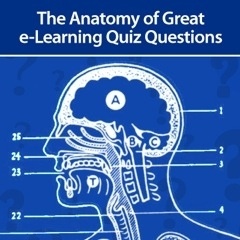One overarching rule to keep in mind as you are writing quiz questions is that they need to be clear. Grammar and parallel structure are important; they go a long way to helping your learners do their best. But there’s a lot more than phrasing that goes into a test question. Check out these tips!
10 Best Practices for Creating e-Learning Quiz Questions
- Provide clear guidelines for the assessment, including estimated time to complete and any additional resources your learners may need. You should also group questions with the same directions together.
- Match each quiz question to a specific learning objective. If this isn’t possible, choose a different type of assessment that better addresses your learning objectives. Lectora e-Learning authoring tool allows you to create many different question types. But remember, never change your learning objectives to match what is easy to assess! That would be doing your learners a disservice. Check out this blog for more tips on creating e-Learning objectives, 4 Tips for Creating Effective e-Learning Objectives.
- Concentrate on the most important, critical content. Don’t waste your learners’ time making them learn trivia.
- Question difficulty should come from the content, not the wording. Keep in mind your learners’ reading levels and avoid double negatives or awkward wording.
- Keep a sticky note at your desk with these words on it: always, often, frequently, never, none, rarely and infrequently. Now, go through your quiz questions and delete all instances of those words. Vague adverbs like these tend to confuse learners.
- Hopefully this is self-explanatory, but take care to ensure that each item has a correct answer.
- You also need to remember to make sure your quiz questions don’t include clues about the correct answer or the answer to other quiz questions.
- Provide examples for complex questions.
- Prepare the answer key at the same time as the assessment. This helps you keep track of everything and make sure you’ve covered all topics.
- Test the assessment before giving it to your learners! You want to make sure it makes sense and doesn’t contain any errors. Check out this blog for tips on evaluating your online training course, How to Evaluate Your Online Training Course.
For more great tips on creating quiz questions, check out the blog How to Create Great Quizzes for Rapid e-Learning. And now you’re ready to create amazing quiz questions, right? Except, it’s not just the question that needs to be well thought out. A key component of every question is the distractors, or the answers that aren’t correct.
Tips for making great e-Learning Quiz Distractors
Here are some tips for making great distractors
- Your distractors need to be plausible. Here are some good suggestions for plausible-but-incorrect distractors:
- Common errors and commonly held myths or misconceptions
- Statements that are true, but do not answer that specific question
- Content that is paraphrased incorrectly
- Using between 3-5 distractors is ideal, and you should vary the number of distractors per question. Keep in mind that the fewer distractors you use, the greater the likelihood that a learner’s guess will be correct.
- Keep distractors about the same length and grammatically similar.
- Avoid distractors that combine two options (“b and c”). This is a clear giveaway for the learner if one of them is obviously correct—or incorrect. On the other hand, it can confuse the learner unnecessarily.
- Vary your placement of the correct answer. The most common placement for correct answers is c and experienced learners know this.
Think you’re ready to become a quizmaster? Download a free 30-day trial of Lectora Inspire and put this knowledge to work!









